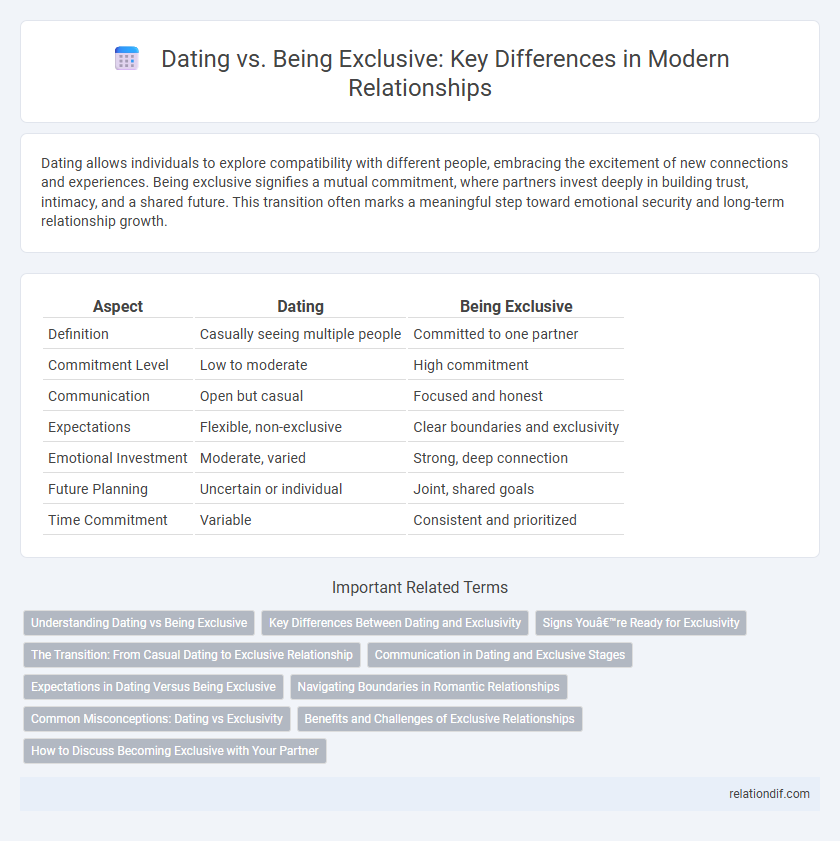Dating allows individuals to explore compatibility with different people, embracing the excitement of new connections and experiences. Being exclusive signifies a mutual commitment, where partners invest deeply in building trust, intimacy, and a shared future. This transition often marks a meaningful step toward emotional security and long-term relationship growth.
Table of Comparison
| Aspect | Dating | Being Exclusive |
|---|---|---|
| Definition | Casually seeing multiple people | Committed to one partner |
| Commitment Level | Low to moderate | High commitment |
| Communication | Open but casual | Focused and honest |
| Expectations | Flexible, non-exclusive | Clear boundaries and exclusivity |
| Emotional Investment | Moderate, varied | Strong, deep connection |
| Future Planning | Uncertain or individual | Joint, shared goals |
| Time Commitment | Variable | Consistent and prioritized |
Understanding Dating vs Being Exclusive
Dating involves exploring romantic connections with multiple people to understand compatibility, while being exclusive signifies a mutual commitment to focus on one partner without seeing others. The transition from dating to exclusivity often requires clear communication and shared expectations about relationship boundaries. Recognizing these differences helps individuals navigate emotional investment and build trust in developing romantic partnerships.
Key Differences Between Dating and Exclusivity
Dating involves seeing multiple people casually without a formal commitment, allowing exploration and flexibility in romantic connections. Being exclusive means both partners agree to focus on each other alone, establishing trust and a deeper emotional bond. Key differences include commitment level, emotional investment, and the clarity of relationship expectations.
Signs You’re Ready for Exclusivity
Recognizing signs you're ready for exclusivity includes feeling a deep emotional connection, consistent communication, and mutual respect with your partner. Prioritizing quality time together and aligning future goals signal a readiness to transition from casual dating to a committed relationship. Trust and comfort in expressing vulnerability highlight emotional maturity necessary for exclusivity.
The Transition: From Casual Dating to Exclusive Relationship
The transition from casual dating to an exclusive relationship marks a pivotal shift in romantic dynamics, emphasizing commitment and deeper emotional connection over casual interactions. Clear communication about intentions, boundaries, and future goals strengthens trust and aligns expectations between partners. This evolution fosters intimacy and stability, distinguishing exclusive partnerships through mutual dedication and prioritization.
Communication in Dating and Exclusive Stages
Effective communication forms the foundation of both dating and exclusive relationships, helping partners align their expectations and feelings. In the dating phase, open conversations about intentions and boundaries foster mutual understanding, preventing misinterpretations. Transitioning to exclusivity, transparent dialogue about commitment solidifies trust and emotional security, enhancing relationship satisfaction.
Expectations in Dating Versus Being Exclusive
Dating often involves casual interactions with multiple people, allowing individuals to explore compatibility without immediate commitment. Being exclusive signifies a mutual agreement to focus on one partner, setting clear expectations of loyalty, emotional investment, and future-oriented planning. Understanding these distinctions helps manage relationship dynamics and ensures both parties share aligned intentions for commitment and trust.
Navigating Boundaries in Romantic Relationships
Navigating boundaries in romantic relationships requires clear communication about dating versus being exclusive, where dating involves exploring connections while exclusivity demands commitment and trust. Understanding each partner's expectations prevents misunderstandings and fosters emotional security, helping to define the relationship's direction. Setting mutual boundaries supports healthy intimacy, respect, and long-term relationship satisfaction.
Common Misconceptions: Dating vs Exclusivity
Many people confuse dating with being exclusive, assuming both mean the same level of commitment, but dating often involves seeing multiple people without boundaries, while exclusivity implies a mutual agreement to focus on one partner. A common misconception is that exclusivity requires formal labels, whereas it primarily depends on clear communication and mutual understanding. Misinterpreting the stages can lead to misunderstandings and unfulfilled expectations in romantic relationships.
Benefits and Challenges of Exclusive Relationships
Exclusive relationships foster deeper emotional connection and trust, enhancing overall relationship satisfaction and stability. However, they require clear communication and commitment, which can sometimes lead to challenges such as managing expectations and navigating potential feelings of restriction or jealousy. Embracing exclusivity often promotes personal growth and mutual support but demands ongoing effort to maintain intimacy and resolve conflicts effectively.
How to Discuss Becoming Exclusive with Your Partner
Discussing exclusivity with your partner involves clear communication about relationship expectations and boundaries, emphasizing mutual feelings and future goals. Use open-ended questions to explore their views on commitment and share your own desires sincerely to ensure alignment. Establishing exclusivity conversations early helps build trust, fosters emotional intimacy, and prevents misunderstandings in romantic relationships.
Dating vs Being Exclusive Infographic

 relationdif.com
relationdif.com